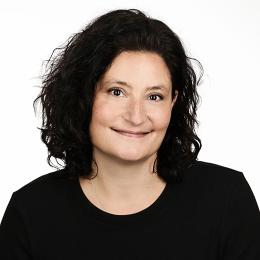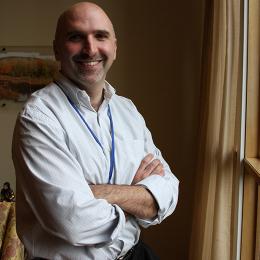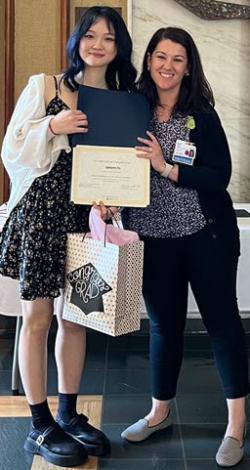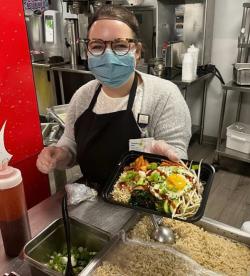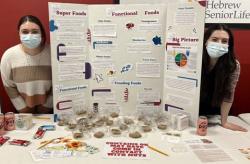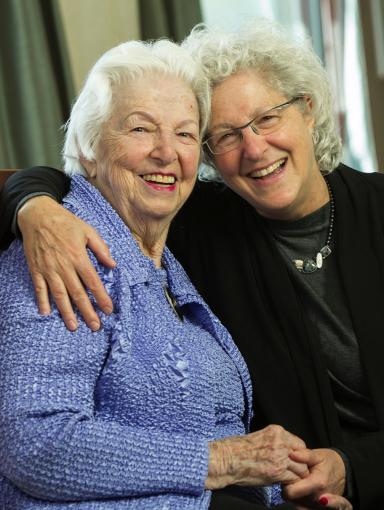Dietetics Training in a Hospital Setting
The Hebrew Rehabilitation Center Dietetic Internship is the only internship in New England in a geriatric long-term care setting. As a long-term chronic care hospital, we serve patients with complex medical needs, including person-centered care for those with chronic illness and short-term post-acute care for patients recovering from a hospitalization, illness, or surgery.
The HRC Dietetic Internship has been granted candidacy status by the Accreditation Council for Education in Nutrition and Dietetics (ACEND), 120 South Riverside Plaza, Suite 2190, Chicago, IL 60606, 312-899-5400, https://www.eatrightpro.org/acend, a specialized accrediting body recognized by the Council for Higher Education Association and the United States Department of Education.
With locations in Boston and at NewBridge on the Charles in Dedham, Hebrew Rehabilitation Center is the only senior health care organization affiliated with Harvard Medical School. And as part of the broader Hebrew SeniorLife network, we offer a full continuum of care for seniors.
About the Curriculum
The Hebrew Rehabilitation Center Dietetic Internship’s mission is to prepare graduates by providing the tools to care for the growing population of older adults in hospital settings. The program will provide an emphasis in clinical nutrition and food service management to help raise the standards in senior health care.
The internship program offers a 9-month, full-time track running from September to May
The internship provides training in a long-term chronic care hospital with a focus on the aging population and clinical rehabilitation. We provide interns with a supervised practice experience designed to provide a strong theoretical knowledge base with practical experiences in:
- Sub-acute clinical nutrition
- Outpatient nutrition services
- Community nutrition
- Food service management
- Skilled nursing
- Long-term medical care
Graduates of the program are eligible to sit for the Commission of Dietetic Registration credentialing examination for Registered Dietitians.
Applying to the Hebrew Rehabilitation Center Dietetic Internship
Hebrew Rehabilitation Center’s Dietetic Internship is participating in the 2025 application process. Please see below for more information.
To apply to a dietetic internship, individuals must complete at least a bachelor’s degree and ACEND-accredited coursework requirements, including Didactic Program in Dietetics (DPD) verification statement. Interns must also either be enrolled in or have completed a master’s degree program.
In addition, the Commission of Dietetic Registration requires that individuals complete coursework and supervised practice in program(s) accredited by the Accreditation Council for Education in Nutrition and Dietetics (ACEND). Graduates who successfully complete the ACEND-accredited dietetic internship at Hebrew Rehabilitation Center are eligible to apply to take the CDR credentialing exam to become an RDN.
In most states, graduates must also obtain licensure or certification to practice. Read more about state licensure requirements.
We strongly recommend that you participate in a virtual open house of the Hebrew Rehabilitation Center Dietetic Internship program. This will allow you to learn more about our organization, the rotations we can offer you, and meet and talk with our program leadership and interns to help determine if our program is right for you. The following dates are available for the 2024-2025 application season:
- Friday, September 6th 2024 11am-12pm
- Wednesday, September 25th 2024 6pm-7pm
- Wednesday, October 2nd 2024 11am- 12pm
- Friday, December 6th 2024 11am-12pm
- Wednesday, December 11th 2024 6pm-7pm
- Friday, January 3rd 2025 11am-12pm
- Wednesday, January 8th 2025 6pm-7pm
Please email Alegria Cohen at alegriacohen@hsl.harvard.edu to register for our open house on your preferred date at least three days in advance.
In-person open houses are also available upon request.
Boston area independent dietetic internships and universities have collaborated to coordinate application and acceptance notification due dates. Hebrew Rehabilitation Center, Massachusetts General Hospital, Brigham and Women’s Hospital, Beth Israel Deaconess Medical Center, Delicious Living Nutrition, Simmons University, Boston University, Tufts University and the University of Massachusetts, together, agreed to align dates into for Fall and Spring application cycles. They are as follows:
Fall
October 8, 2024, applications will be due no later than October 8, 2024.
November 1, 2024, applicants will be notified of the program’s decision by the end of the business day on November 1, 2024.
November 15, 2024, applicants must notify the program either accepting or declining the offer by 5:00pm EST on November 15, 2024 by emailing the program director, Alegria Cohen, at AlegriaCohen@hsl.harvard.edu
Spring
January 15, 2025, applications will be due no later than January 15, 2025
March 1, 2025, applicants will be notified of the program’s decision by the end of the business day on March 1, 2025
March 15, 2025, applicants must notify the program either accepting or declining the offer by 5:00pm EST on March 15, 2025 by emailing the program director, Alegria Cohen, at AlegriaCohen@hsl.harvard.edu
The Class of 2026 will start on September 8th, 2025
Submit your nonrefundable $75 application fee by October 8th, 2024 for the fall application cycle, or January 15th, 2025 for the spring application cycle.
Applicants must submit their application via the Dietetics Inclusive Centralized Application Service no later than October 8th, 2024 for the fall application cycle or January 15th, 2025 for the spring application cycle.
The complete online application packet must include:
- The standard application form
- Personal statement
- All transcripts
- Current resume
- Three reference letters: one professor, one work/volunteer supervisor, and one from either a professor or work/volunteer supervisor
All applicants must participate in either a Zoom or in-person interview.
Please note that the Didactic Program in Dietetics (DPD) completion date on the final verification statement must be prior to the program start date, September 8th, 2025.
Once an applicant is accepted into the program, Hebrew SeniorLife’s Professional Development will contact the applicant to start the onboarding process. Our dietetic interns are subject to the same screening process as other trainees, such as background checks and medical documentation. Covid-19 vaccinations are required to participate in our internship. The onboarding process must be completed in order to start the program.
